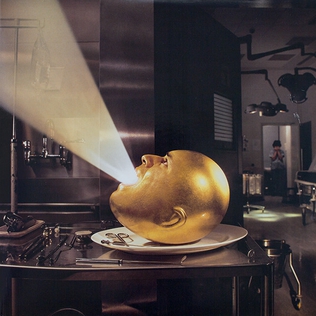
Quite simply, I had never heard anything quite like The Mars Volta. I heard rumblings of a new project from former At The Drive-In members, Omar Alfredo Rodríguez-López and Cedric Bixler-Zavala, but my expectations for the music that this band would go on to release would be blown out of the water. De-Loused in the Comatorium is based on a short story by Bixler-Zavala and sound manipulation artist, Jeremy Ward, that imagines a man who enters a week-long coma after overdosing on rat poison and morphine. The record was produced by Rick Rubin (Red Hot Chili Peppers, The Strokes) and showcases a band taking extreme risks in their progressive-rock sound that exceeded any expectations that their label could have hoped for when they signed the band. The album was both a commercial and critical success that would eventually be certified gold in the United States.
From the quiet opening of “Son Et Lumiere” to the explosion of sound on the lead single, “Inertiatic ESP,” The Mars Volta would bend the minds of all who put on a pair of headphones and sat down to listen to De-Loused in the Comatorium. The band would go on to seven studio albums, with their latest being a self-titled release after a ten-year hiatus, and re-set the bar for what prog-rock could be and become a beacon for music creativity for the foreseeable future.
The album also features some hints of jazz infusion, frenetic time signature changes, and rapid re-directions of the sound being brought through the mix to leave the audience breathless for where the band could take their music next. Early standouts like the expansive, 7-minute songs “Roulette Dares (The Haunt Of” and “Drunkship of Lanterns,” painted a picture of artists willing to throw the entire kitchen sink at the wall to see what would stick. “Eriatarka” showed that this band was capable of slowing down the tempo just enough to hear the lyrics that Cedric Bixler-Zavala was crooning, only to speed up on the choruses to engulf the listener into a vortex of sound.
The longest song on the set, “Cicatriz ESP,” hinted at where The Mars Volta would explore on the brilliant sophomore album, Frances The Mute, and yet nothing about this band could be classified as “predictable.” They were the furthest thing from conforming to the radio-ready standards of three or four-minute rock songs, and instead would reinvent the possibilities for where rock and roll could go.
The strange sounds in the beginning of “The Apparatus Must Be Unearthed” bleed away into the brilliant drumming of Jon Theodore, who makes sure that he remained just as memorable in his contributions to the sound as the two-headed monster that is Omar Alfredo Rodríguez-López and Cedric Bixler-Zavala. The only other single to be released from the set was the somber “Televators” that recognized an artist capable of painting with wide, broad strokes on a canvas of endless possibilities. Closing out the set with arguably the best song on the album, “Take The Veil Cerpin Taxt,” is a bold choice on a record filled with more breathtaking moments to count, and showcase the brilliance of these collective minds in The Mars Volta.
The band captured lightning in a bottle on De-Loused in the Comatorium, that can only be described to an outside observer as a “musical experience unlike any other.” At a time when many alternative rock, emo, and punk rock bands thought that they were pushing the envelope with their latest creative opus, The Mars Volta blew the door off the hinges with an album that still sounds as aggressive, fresh, and transcendent to this day.
 Intertiatic ESP
Intertiatic ESP